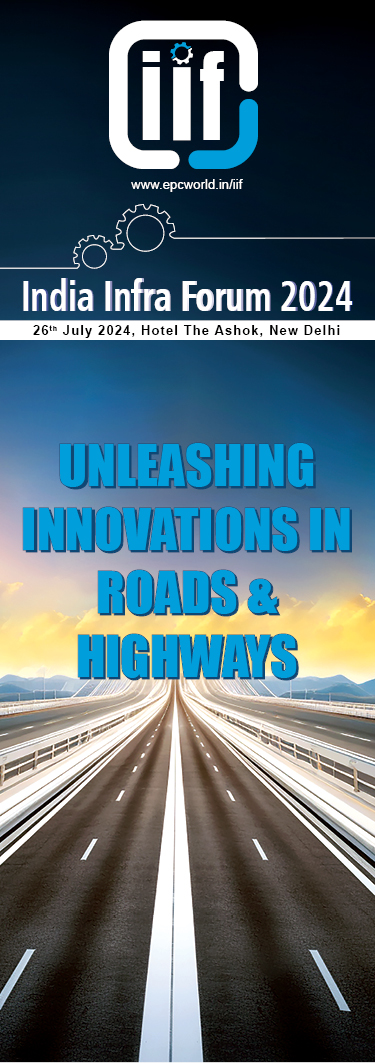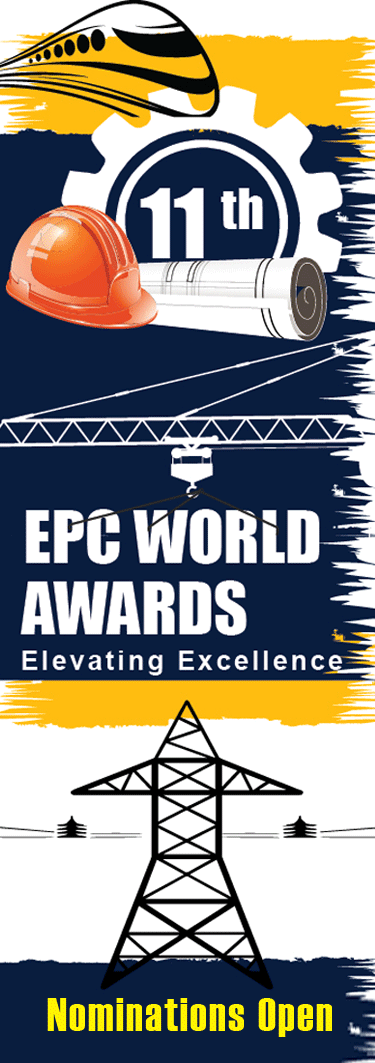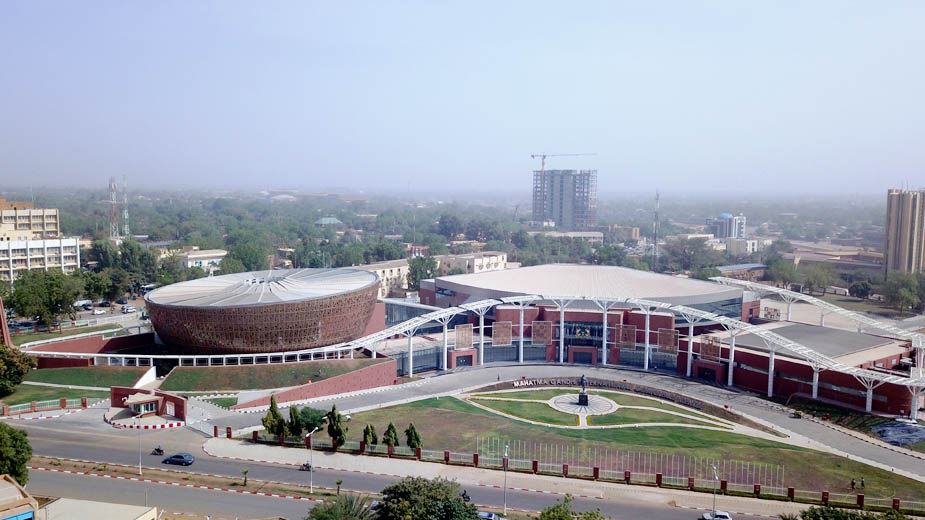by S K Singh, Regional Head (West Africa), Shapoorji Pallonji E&C
Shapoorji Pallonji overcame many challenges while executing the prestigious international standard Conference Center for the Republic of Niger
Project Background
The Republic of Niger had been chosen as the host country for the 33rd Ordinary Session of the Conference of Heads of States and Governments of the African Union originally scheduled in July 2019. In view of the international nature of this event, the city of Niamey was to be the focal point of 55-member states of the African Union, representatives of international and regional organisations and journalists. The meeting was expected to attract 5,000 participants including 55 Heads of African States and Governments.
While taking the initiative to host this important African Union Conference Niger had sought to increase its visibility in the African and international scene, to enhance its diplomatic outreach and to allow investors to take advantage of the spinoffs of this event. At that point, Niger did not have adequate infrastructure to hold a conference of this stature and therefore, it was imperative that a new conference center be built to host such events.
With this background, the Niger government planned for the construction of an International Conference Center at Niamey, the capital city of Niger. The Conference Center was also a way to strengthen the national infrastructure capacity and allow Niger to host conferences of Francophone and other countries frequently.
The Niger government had deployed finances for other developmental projects and hence, required support to make this dream feasible. At the same time, it was critical that financial and technological support be deployed to realize an international standard conference center. The Government of India was quick to extend a grant of USD 35.48 Million and the Government of Niger mobilised an additional USD 20.52 Million for setting up the conference center. The project was named as the Mahatma Gandhi International Conference Centre (MGICC). The Niger government allocated the land for the project in the heart of Niamey, in close vicinity of government offices and the President’s residence.
The strong ties between the Republics of India and Niger ensured that the project received all approvals on priority. The project was put on a fast track.
Shapoorji Pallonji & Co (SP) was selected as the EPC Contractor for this prestigious project by the Government of Niger. SP engaged STUP Design Forum, Mumbai for the concept design and detailed engineering. SP’s Design Studio in Dubai oversaw the design delivery. SP submitted the proposal to GON in Jan 2018 and after various discussions, negotiations, the order was confirmed in July 2018. NBCC India was appointed as the Project Management Consultant by the Government of India. By the time the contract agreement was signed in Oct 2018, the available time for the construction had reduced further. The construction works commenced immediately thereafter.
SP’s project management team recognized the fact that they faced additional set of challenges while managing an international project of this nature - challenges that were not encountered on domestic projects. Such challenges included different time zones, different languages, different cultural dimensions, distributed teams, distant geographical locations, logistics issues, communication and coordination. SP’s team developed a robust project delivery plan filled with contingency plans for almost every conceivable issue.
Salient Features of Design
SP offered complete creative freedom to the design team from STUP Design Forum while also contributing many suggestions based on its construction experience in West Africa.
The design team drew inspiration from the natural landscape of Niger and from the motifs and symbols of the local culture to develop the architectural design of the MGICC complex. The three main buildings are laid out to resemble the path of the flowing Niger river. The Freedom Tower finish resembles the adobe wall of Agadez Mosque. The Presidential Hall is designed to resemble a Calabash – a bowl-like decorated utensil used to carry food and other goods by the locals in Niger. The Screen Façade design resembles local salt pan patterns. The GRC Dry Cladding carries imprints of tribal symbols of Niger. The Steel roof frames used in the periphery of the buildings resemble the pattern of Baobab trees. The salt pans & local cloth patterns have been used for the carpet design and walls have been decorated with local artwork.
The MGICC complex has been designed as a spacious, modern and eco-friendly facility spread over a built-up area of 175,000 sft. The facility has a capacity to host 3,300 guests together and is equipped with state-of-the-art features and facilities like Presidential Block (23.56m high with 55m dia. roof covering), Plenary Hall (18.76m high roof covering, with 50m longest truss span), Multi-function meeting and Banquet Hall (9.15m high roof covering), Administration Ministers’ Block and an Exposition/Museum space depicting the life of Mahatma Gandhi, Nelson Mandela and other legends. Other facilities include Utility Building, Guard Room, Freedom Tower (21.57m high) along with external development, Landscaping, water bodies, utilities, etc.
The SP team appreciated the diverse perspectives and ideas that architects, designers brought to the table to address the customers’ special needs. Further, the execution team also contributed their experiences to make the designs more construction-friendly in order to ensure a successful Design-Build project delivery.
The Design Phase
SP teams at Dubai, Mumbai, Ghana and Niger coordinated with STUP’s Mumbai office for the design development, design reviews and preparation of GFC drawings.
The subsoil conditions and the water table actually encountered at the site were not very inspiring and varied from those envisaged during the bid phase. A decision was made to adopt pile and grill mat footings in Presidential and Admin blocks in lieu of isolated footings planned earlier. Also, it was decided to adopt RCC columns in lieu of Steel columns owing to the lead time for procurement of fabricated steel into Niger.
The geometry of the buildings especially the Presidential Block and the arrangement of Structural truss members, roofing and roof gutters were pretty tricky. In the bid phase, it was planned to adopt pre-engineered structural steel for the columns and roof elements. However, during the execution stage, discussions with subcontractors led to the conclusion that the complex arrangement of the roof elements with varying spans across all directions could be better executed with conventional fabrication methods. The structural designs were modified to accommodate this change. The roof comprised of double skinned aluminium standing seam roof with insulation, sound transmission and impact insulation.
Some more design changes were required as the client preferred the escalator area with a ‘closed roof’ instead of the earlier ‘open to sky’. The project team was committed to steer the design process in a way that allowed a smooth execution take-off.
Resources Mobilisaton
The construction workmen were mobilised from neighbouring countries, viz, Nigeria, Burkina Faso, Ghana, Chad, Sierra Leone, Togo, Senegal, Gambia and also from Oman, Dubai and India. The project staff members comprised of citizens from India, Oman, Dubai, Niger, Togo, Ghana, Senegal & Ivory Coast. At the peak of the project, SP arranged a chartered flight to fly about a 100 of its expert workmen and supervisory staff from India to Niger. These involved skilled personnel for MEP, Façade, ID and finishes works. The project team had to cope with infrastructure-related issues in Niger, such as transportation, housing and medical facilities.
The staff and construction workers were accommodated in leased dwellings and transported in company vehicles. The company provided DG sets at the staff accommodations to overcome electricity shortages. Special permits had to be secured from the Niger government for securing Indian staples and food items for the staff and workers, through road transport from Ghana.
Landscape nurseries were setup at sites close to the project well in advance which came in handy towards the end of the project while executing the landscaping works.
Procurement Challenges
As confusing and complicated as it was to develop a global project procurement plan, these complications paled in comparison to those that arose during the project implementation.
Niger is a land-locked country in West Africa surrounded by seven other countries. Niger has road and air connectivity but no rail connectivity. The nearest port is Cotonou in Benin which is almost 1100 km from Niamey.
A typical consignment of construction materials had to be brought in by the sea route to Cotonou port in Benin. Post this, the consignment was cleared by Port Authority Benin, Benin Customs and Border, Niger Customs and border sequentially. Typically, it took 60-90 days for the consignments to arrive at the site. Delays in getting exoneration affected timely procurement of imported items and local procurement items like cement. In addition, scarcity of construction materials like cement, steel, wood, paint, asphalt, etc, in Niger impacted the work progress at the MGICC project. Instances of stoppages of import from neighbouring countries were common owing to border closures or unrests.
The high side MEP equipment were imported from India whereas the architectural finishing materials were brought in from Dubai and India. Interior and Furniture items were procured from India, Dubai and Turkey.
The structural steel roof trusses and other elements were fabricated at the subcontractor’s factory in Bhuj, Gujarat. Some of the fabricated roof trusses weighting 600 MT as well as MEP equipment, Roofing material, statue of Mahatma Gandhi and few finishing items weighing 200 MT were airliftedby chartered air cargo from Ahmedabad, Delhi and Mumbai after the materials were transported to the respective airports from different part of India. The Procurement and expediting teams in SP’s Mumbai and Dubai offices coordinated the whole effort.
Execution Challenges
For the truss erections, SP deployed high capacity cranes of capacity 250 and 500 tonnes from neighbouring Ghana.
Shapoorji Pallonji reworked its program, construction sequences, priorities, strategies, resources deployment to achieve the phase 1 milestone by end June 2019 so that GON could host the African Union Conference in the first week of July 2019.
All the buildings had distinct architectural styles and hence did not allow for repetition of formwork resources. To expedite the Structural Steel Trusses, Roofing, MEP Works and False ceilings, it was decided to erect a safe working platform supported over staging for workers to access the false ceiling level and for installation of MEP ducts, pipes and cables. Work was carried out in three shifts with additional gangs deployed. At the peak of the project, 2000 workers were engaged to give the project a concrete shape.
The project team members were aware that they needed much more than their proven best practices from their past experiences to deliver the MGICC project.
The project involved a good amount of high-end architectural finishing works considering the landmark nature of the project fit for hosting international conferences. This required careful attention to details and meticulous execution of the architectural finishes for the Conference Centre, the Freedom tower and the statue of Mahatma Gandhi. SP deployed finishing and interiors experts from Dubai, India, Oman and Ghana to ensure the quality of workmanship. The job required close coordination with specialist subconsultants and subcontractors for specialised works. These agencies were based in India, Dubai and Turkey. SP was managing about 35 specialized subcontractors working on the project.
The site faced many challenges due to erratic power supply from the grid and had to use DG power to keep the progress going. Some border closures issues led to instances of import bans that affected cement procurement. The project team had to resort to local procurement of cement at exorbitant prices to keep the project running. Pilferages of construction materials were pretty common.
The project team was performing to its best to ensure client satisfaction while facing various challenges wrt safety, quality and timely completion.
Cashflow Conundrum
The project team was not only managing the execution and contractual risks but also complex currency and banking transactions.
As per the MoU between the Governments of India and Niger, GoI cleared payments against certified bills to Embassy of India. The Embassy of India then transferred the funds so received to GoN which are later transferred to SPCPL. This process of transaction consumed huge time because of many banking regulations and impacted the cashflow of project.Slow banking system due to controlled USD transactions and channelling of money through intermediary banks resulted in delayed payments and heavy banking charges. Due to Internet banking limitations in Niger, online transactions were time consuming. Usually, only cheque books or OTT were acceptable. This required extra efforts on part of SP’s accounting teams and field staff.
Health & Safety
The climatic conditions in Niger were not very conducive for round the clock construction activities as instances of malaria infection amongst staff and workers were frequent. The company accommodations and the working environment were periodically monitored and fumigated to prevent the spread of malaria. SP implemented a high standard of HSSE system on the project and the team achieved 5.4 million safe manhours on the project.
The Importance of Soft Skills
SP’s leadership team relied on some essential soft skills while interacting with the client team. The team carefully studied and respected the ethnicity, class, traditions and norms of Niger and its people. The team acknowledged the aspiration of the Government of Niger and leveraged effective listening, communication and leadership techniques to meet the client expectations. This approach helped mitigate many potentially difficult situations.
The project team had to mandatorily use French language for contractual correspondence. However, this involved some inherent challenges in communication. Hence, the project team hired language translators and corresponded with the client in both French and English to overcome the language barrier and for better understanding and coordination.
Despite several logistical and technical challenges, the Shapoorji Pallonji team successfully delivered the MGICC project in Dec 2019, ie, within just 13 months from the date of commencement. The complex was formally inaugurated, jointly by the President of Niger Mahamadou Issoufou and the Indian Foreign Minister S Jaishankar, on 21 January 2020. The design and construction quality have been appreciated by all the visitors to this complex.
The Mahatma Gandhi International Conference Center is a landmark for India-Niger friendship and a symbol of India’s firm commitment towards Africa.
Most often, it is not only the technical strength of the project team (which is accepted as given) but the soft leadership skills like understanding of cultural differences, effective communication skills and the extraordinary level of interpersonal skills which create trust. This trust then fosters collaboration and drives the project to success. This was even more true for the MGICC Niger project.






